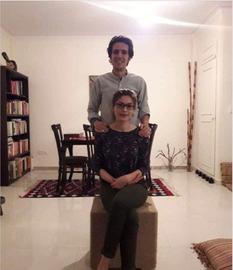The Islamic Republic is continuing its relentless suppression of labor protests, targeting workers for Haft-Tappeh Sugarcane Company and the steelworkers of the National Steel Industrial Group in the southwestern province of Khuzestan. Authorities have arrested labor activists and tortured them and then broadcast their forced confessions on the state-run TV.
The workers demand payment of their overdue wages and call for an end to the plunder of the companies by corrupt top management. However, the Iranian government has portrayed their actions as “conspiracies” and “activities against national security” —even when the workers have been proven to be correct in their accusations.
For example, after the protests started, Haft-Tappeh CEO Omid Assadbeygi went missing. On October 10, 2018, without providing any names, Tehran Prosecutor Abbas Jafari Dowlatabadi made statements about a company in Khuzestan being guilty of “currency violations.” Referring to currency loans that had not been repaid, he said: “For instance, somebody who has purchased a company in Khuzestan, and who has received $800 million between 2015 and 2017, has not met his obligations and is now on the run.” This was a reference to individuals who authorities allow to purchase dollars at the officially-set rate instead of at a much higher free-market rate. And on January 1, the prosecutor of another court identified Assadbeygi as the criminal guilty of robbing both the government and the company.
The Arrests
After the arrests of Esmail Bakhshi, a leader of the Haft-Tappeh Sugarcane Factory Labor Union, and Sepideh Gholian, a civil rights activist who participated in the protests, security officials also arrested Asal Mohammadi, Amir Hossein Mohammadi Fard, Sanaz Allahyari, and Amir Amirgholi — all members of the editorial board of the pro-labor publication Gam, which has published news about the protests.
Asal Mohammadi was transferred to Sepidar Prison in Ahvaz, the capital of Khuzestan, after being arrested in Tehran. He was released on January 5 after 32 days on a bail of 400 million tomans ($95,000). Intelligence ministry agents arrested Amir Amirgholi, who has been held on political charges in the past, on January 14 at the home of his father in the northern city of Babolsar. On January 9, security agents arrested the two other members of the editorial board, Amir Hossein Mohammadi Fard and his wife Sanaz Allahyari, and transferred them to Ward 209 at Evin Prison.
More arrests followed on January 29. Jafar Azimzadeh, secretary of the board of directors for the Free Union of Iranian Workers, and Parvin Mohammadi, vice president of the union, were both arrested. Azimzadeh was later transferred to Evin Prison. Mohammad Ali Jedari Foroughi, Azimzadeh’s lawyer, confirmed the arrest of his client on Facebook and wrote: "I managed to meet Jafar Azimzadeh for a couple of minutes, hours after his arrest."
Describing his client as "proud" and “firm,” Foroughi wrote, "Azimzadeh has been sentenced to six years in prison for 'actions against national security' and 'propaganda against the regime' by Branch 15 of Tehran Revolutionary Court." According to Foroughi, in 2016 Azimzadeh had also been sentenced to 11 years in prison for the same charges by another branch of the Revolutionary Court in the city of Saveh, southwest of Tehran. After a 60-day hunger strike he was released on bail, but now he is back in prison.
Sepideh Gholian
Sepideh Gholian remains in detention. Before her second arrest, she recorded a short video in which she talked about what she had gone through during 31 days of interrogation and torture by the intelligence ministry. BBC Persian posted the video on its site soon after she was re-arrested. “I don’t know where and in what conditions I will be when this video is published,” she says in the 11-minute video. There are worries that she is under pressure to make a fresh forced confession and that the authorities might be bringing new charges against her.
An informed source told IranWire that at the end of the first week of February, Gholian’s family was allowed to visit her at the Intelligence Bureau’s Detention Center in Ahvaz. “The meeting took place in the presence of the security agents,” the source said, “and Sepideh was unable to tell her family about conditions [in the prison].”
According to the source, after the audio file of an interview with Sepideh Gholian’s father was posted online, the family had faced repeated threats. Because of this, the family is now refusing to give any more interviews. In addition, the court has yet to approve Jamal Heydari-Manesh as Gholian’s new attorney.
Earlier, Jamal Heydari-Manesh tweeted that judiciary officials in the city of Shush, where Gholian is being held, have refused to work with him. “Today I arrived in Shush,” he reported. “I had to announce for the second time that I was her attorney on record. When I submitted a request to release her on bail, they refused to even register it. I insisted on meeting the prosecutor and when I asked to meet Sepideh, they rudely rejected my request.”
February 11 was the 40th anniversary of the 1979 Islamic Revolution, and Gholian’s lawyer has drawn parallels between what his client is going through and the historic treatment of prisoners in the Islamic Republic.“There is no doubt that these days we will hear a lot about the torture of the revolutionaries [before the revolution],” Heydari-Manesh tweeted. “Today, on my way to Shush, I passed by the sign for Haft-Tappeh. This made me think: Is there someplace where all those tortures during the Pahlavi regime are proven? Did the justice ministry, Savak [the Shah’s secret police] and members of the parliament approve of such beastly cruelties? Or was this all libellous and propaganda against that regime?”
Farzaneh Zilabi, Esmail Bakhshi’s Lawyer
In recent days, Esmail Bakhshi’s lawyer Farzaneh Zilabi has been summoned to court to answer questions. IranWire sources confirm that she was reprimanded for giving interviews and talking to the media about her client and was threatened with prosecution for her contacts with the media.
It yet not known where Esmail Bakhshi is detained and in what conditions. On February 11, the Telegram channel of Haft-Tappeh labor union reported that both Bakhshi and Sepideh Gholian are under intense pressure to repent and agree to another TV confession.
Amir Hossein Mohammadi Fard and Sanaz Allahyari
An informed source told IranWire that the couple Amir Hossein Mohammadi Fard and Sanaz Allahyari, both journalists, are being held at Evin Prison. The two have been detained for more than a month, but Evin Court’s officials have told their family that “they are not being released and it is not clear when their interrogation will be over.” The two have had no contact with their family for 12 days now.
Amir Amirgholi
There has been no news about labor activist and journalist Amir Amirgholi. His family’s repeated requests to meet with him have been denied. Since his arrest on January 14, he has been allowed only two short phone calls to his family.
IranWire’s source said that Amirgholi’s family have gone to the courthouse every day but officials there even refuse to accept medication the family have tried to give him. Amirgholi suffers from diabetes and requires insulin injections four times a day. He did not have any insulin with him at the time of his arrest and his family are extremely worried about his health.
Behnam Ebrahimzadeh
Authorities arrested Behnam Ebrahimzadeh on December 12, 2018 in Tehran. A source close to the labor activist told IranWire that he has not yet been released — despite the bail set by the court being posted. “After his father Rahman Ebrahimzadeh protested in front of Tehran’s prosecutor’s office and the media reported the protest, Behnam phoned his family and told them that the prosecutor had set a bail amount of 200 million tomans [close to $48,000] for his release. Bail was posted 14 days ago but he is still under arrest.”
Letter by Iranian Lawyers to the UN Special Rapporteur
On January 21, a group of Iranian lawyers wrote a letter [Persian link] to Javaid Rehman, the UN Special Rapporteur on the human rights situation in Iran, expressing their concerns about the cases of Esmail Bakhshi and Sepideh Gholian and urging him to raise them during a special session of the UN’s Human Rights Council. According to the lawyers, Bakhshi and Gholian have been denied due process of the law and they say that, as with most political detainees in Iran, their rights have been violated.
Even before Bakhshi and Gholian were arrested and put on trial, says the letter, security agencies and the media affiliated with the government of the Islamic Republic broadcast a video on state-run TV, airing charges and the verdict against them even before the trial started.
In the letter, the lawyers informed Javaid Rehman that they had previously sent two letters to Iranian officials [Persian link] but had not received a reply, leaving them with no option but to appeal to him.
Security Agents Stand Guard over Workers
There are also reports that security agents have been deployed inside Haft-Tappeh Sugarcane Factory and the National Steel Industrial Group’s steel mill. Some labor sources also report that the workers have been forced to sign blank papers and a labor contract for three months. The contracts, they say, were dated two months before the day the workers signed them, meaning that the employers can dismiss any worker at any time they choose.
Haft-Tappeh, the National Steel Group and other companies used be owned and run by the state. But since the mid-2000s, these companies have been gradually privatized and, in many cases, this has led to disaster.
Related Coverage:
Intelligence Ministry Takes Revenge on Labor Activist, February 4, 2014
Torture of Arrested Labor Activists and Their Families Continues, February 1, 2019
Agents Target Jailed Activist's Family in Brutal Attack, January 23, 2019
Iranian TV Airs Forced Confessions of Labor Activists, January 23, 2019
Rouhani Government to Sue Labor Leader for Torture Claims, January 9, 2019
Activist Challenges Intelligence Minister to TV Debate, January 4, 2019
Labor Protests and Arrests Continue, December 12, 2018
Crackdown on University Students for Supporting Striking Workers, December 10, 2018
Sugar Refinery Workers Face New Round of Harassment, December 5, 2018
Pro-Labor Student Protest Ends in Violence, December 5, 2018
Striking Steel Workers Tell Rouhani: "We Have Had it!", December 3, 2018
Arrest and Torture of Protesting Workers, November 29, 2018
The Rise and Fall of Haft-Tappeh Sugar Factory, November 22, 2018
Hepco in Three Acts: The Disaster of Privatization in Iran, May 29, 2018
The Plight of Iran’s Unpaid Workers, April 10, 2018
visit the accountability section
In this section of Iran Wire, you can contact the officials and launch your campaign for various problems


























comments